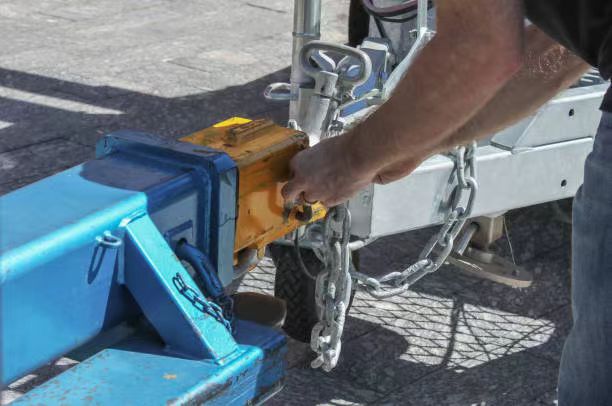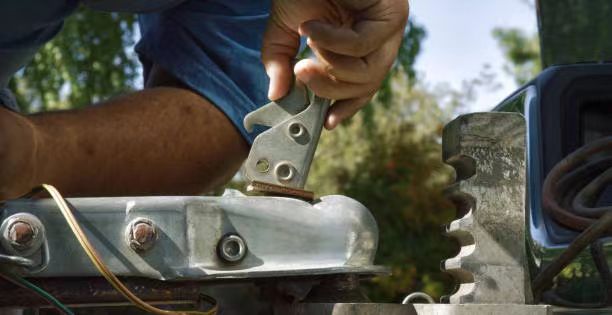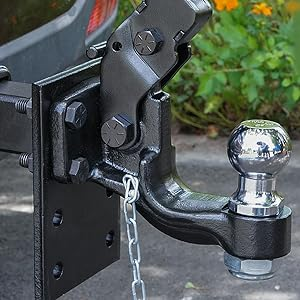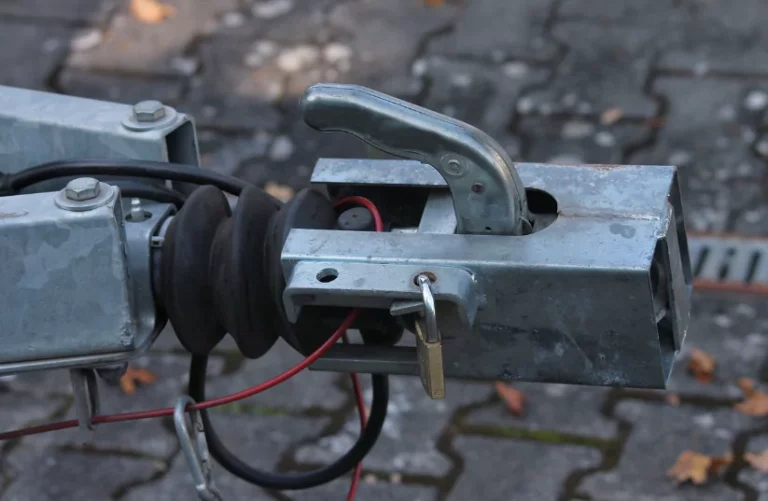Getting the right trailer couplers is very important when you’re pulling. Choosing the right trailer couplers will make sure that pulling is safe, quick, and easy.You can choose wisely if you read this piece about trailer couplers.
What is a Trailer Coupler?
Definition and Function
A trailer coupler is a device that is attached to the trailer tongue and connects to the towing vehicle. The primary function of a trailer coupler is to secure the trailer to the towing vehicle, allowing the vehicle to pull the trailer safely and effectively. As the main link between the two, it makes sure that they move at the same time.
Importance in Towing Safety
The significance of a trailer coupler in towing safety cannot be overstated. A reliable trailer coupler keeps the trailer firmly attached to the towing vehicle, preventing accidents, disconnects, and potential road hazards. Ensuring that the trailer coupler is properly installed and maintained can make the difference between a smooth towing experience and a dangerous situation.
Types of Trailer Couplers
Before you buy a trailer coupler, you need to know about the different kinds that are out there. Each type of trailer connection is used for different things and has its own pros and cons. We’ll talk about the most popular types here.
Ball Hitch Couplers
Common Uses
Ball hitch couplers are among the most commonly used trailer couplers. They are often found on small cargo trailers, utility trailers, and boat trailers. This type of coupler connects to a spherical “ball” on the towing vehicle, which allows for smooth rotation and flexibility when maneuvering turns.
Advantages and Disadvantages
One of the primary advantages of ball hitch couplers is their ease of use and versatility. They are easy to use for short-term towing needs because they can be quickly linked and removed. On the other hand, they also have some problems. Ball hitch couplers can come loose when they are under a lot of stress or load, so they need to be inspected and maintained regularly.
Additionally, they may not be suitable for very heavy trailers where more robust coupling mechanisms are required.
Pintle Hitch Couplers
Typical Applications
Pintle hitch couplers are ideal for heavy-duty towing scenarios. They are often used in the military, in factories, and in farms where heavy loads need to be pulled. The pintle hitch works by connecting a hooked arm on the coupler to a lunette ring on the trailer, creating a very secure and robust connection.
Pros and Cons
The primary advantage of pintle hitch couplers is their strength and reliability under heavy loads. They provide a more secure connection than ball hitches, which is crucial for safety when hauling significant weight. On the downside, pintle hitches can be noisier and contribute to a rougher towing experience due to less flexibility compared to ball hitches. Another thing that can make them harder to use is that they can be harder to connect and separate.
Gooseneck Couplers
Where They are Used
Gooseneck couplers are typically used on larger trailers such as livestock trailers, car haulers, and large flatbed trailers. These couplers attach to a ball that is mounted in the bed of a pickup truck, providing a different and often more stable towing experience. Due to their design, gooseneck couplers are often favored for hauling heavier loads over long distances.
Benefits and Drawbacks
One of the major benefits of gooseneck couplers is their enhanced stability and weight distribution, which can significantly reduce sway and improve handling while towing. They also have a smaller turning radius, which makes it easier to move around in small areas. But adding a gooseneck hitch means making changes to the truck bed, which can be pricey and take a lot of time. They also may not be practical for individuals who need to frequently switch between towing and using the bed of the truck for other purposes.
How to Choose the Right Trailer Coupler
Assessing Your Towing Needs
The first step in choosing the right trailer coupler is to assess your specific towing needs. Consider the type of trailer you will be towing, the terrain you will be navigating, and the frequency with which you will be towing. For instance, a ball hitch might suffice for occasional light towing, while a pintle or gooseneck coupler might be necessary for more demanding towing requirements.
Evaluating Weight Capacities
Understanding the weight capacity of both your trailer and towing vehicle is crucial. Each type of trailer coupler has a specified weight capacity, and exceeding this limit can lead to dangerous situations. Always check your vehicle’s towing capacity and match it with the appropriate coupler type to ensure safe and efficient towing.
Considering Ease of Use and Installation
Ease of use and installation are also significant factors to consider. Some trailer couplers are straightforward to connect and disconnect, making them ideal for those who tow frequently. Others might require more effort and time, which can be a drawback if you are looking for convenience. Think about how often you will need to use the coupler and choose one that suits your lifestyle and skills.
The professional trailer parts maker Qingdao Go Trailer Parts Company, which is based in Qingdao, China, has a lot of different high-quality trailer couplers for sale. With more than 15 years of experience in selling trailer tires and wheels, Go Trailer Parts has become a reliable company in the field. Their trailer couplers are designed to provide secure and reliable connections between the trailer and the towing vehicle.
Go Trailer Parts specializes in manufacturing and supplying trailer couplers that meet the highest standards of safety and performance. They pay close attention to every detail when making their couplers, which makes sure that the link is strong and lasts a long time. Whether it’s for boat trailers, cage trailers, or car trailers, Go Trailer Parts offers a variety of couplers to suit different trailer types and requirements. Their collection of trailer couplers covers a great variety of high-quality products like 4.4T Australian Override Brake Trailer Coupler and 2″ Ball, 3″ Channel - 5,000 lbs Trailer Coupler. With a team of professional engineers, senior welders, and experienced workers, as well as advanced production equipment, including CNC machines and laser cutting machines, Go Trailer Parts ensures the highest level of quality and precision in their couplers.
Maintenance Tips for Trailer Couplers
Regular Inspection and Cleaning
Regular inspection and cleaning of your trailer coupler are essential for maintaining its functionality and safety. Inspect the coupler before each use for signs of damage, rust, or wear. Cleaning the coupler after each use can also keep dirt and other things from building up and making it stop working properly over time.
Lubrication Guidance
Lubricating the moving parts of your trailer coupler is another crucial maintenance task. Proper lubrication ensures smooth operation and reduces the risk of wearing down the components. Use a high-quality lubricant and apply it to the hitch ball, locking mechanism, and any other moving parts at regular intervals.
Checking for Wear and Tear
Even with regular maintenance, all trailer couplers will eventually show signs of wear and tear. Check the joint for harm such as cracks, dents, or other issues that could make it less reliable. If you notice significant wear, it may be time to replace the coupler to ensure safe towing.
Troubleshooting Common Issues with Trailer Couplers
Misalignment Problems
One common issue with trailer couplers is misalignment, which can make it difficult to properly connect the trailer to the towing vehicle. This can be caused by improper installation or damage to the coupler or hitch. Make sure both the coupler and hitch are aligned correctly and adjust as necessary to resolve alignment issues.
Difficulty in Locking or Unlocking
If you experience difficulty in locking or unlocking your trailer coupler, it could be due to dirt, rust, or mechanical failure. Clean the coupler thoroughly and apply lubricant to the locking mechanism. If the problem keeps happening, check the coupler for damage and decide whether to fix it or get a new one.
Signs of Damage or Wear
Regularly check your trailer coupler for signs of damage or wear. Look for cracks, rust, or deformities that could indicate a compromised coupler. Address any issues immediately to prevent potential towing hazards. If you’re unsure, consult a professional for an expert assessment.
Safety Tips When Using a Trailer Coupler
Ensuring Proper Attachment
Always ensure that your trailer coupler is properly attached before starting your journey. Double-check the connection between the coupler and the hitch, and make sure it is securely locked. A properly attached coupler is vital for safe towing.
Utilizing Safety Chains
Safety chains provide an additional layer of security in case the trailer coupler disengages from the hitch. Attach the chains in a crisscross pattern under the trailer tongue, ensuring they have enough slack for turns but are not dragging on the ground. This can prevent accidents and protect you and others on the road.
Conducting Pre-Trip Checks
Before embarking on any towing trip, conduct thorough pre-trip checks. Inspect the trailer coupler, hitch, and safety chains to ensure they are in good working condition. Check tire pressures, lights, and brakes as well to ensure your towing setup is road-ready. Taking these steps can make a significant difference in your safety and towing experience.








